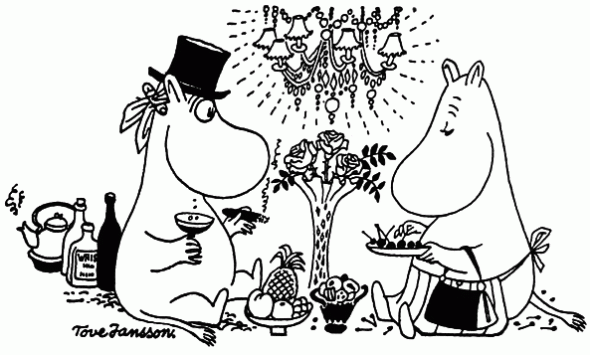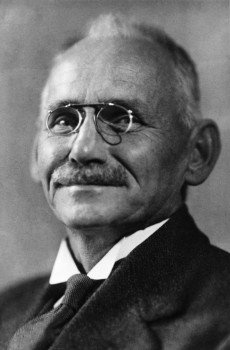Archive for August, 2010
Dark, cold – yet happy?
27 August 2010 | This 'n' that
 In the fields of education, health, quality of life, economic dynamism and political environment, the best country in the world is… Finland.
In the fields of education, health, quality of life, economic dynamism and political environment, the best country in the world is… Finland.
According to the American Newsweek magazine (August 15), Finland is now the best place to live – if you appreciate the factors of life mentioned above. On the list of a hundred countries, Switzerland and Sweden were numbers two and three. More…
Translation prize
27 August 2010 | In the news
This year the Finnish Government Prize for Translation of Finnish Literature – worth € 10,000 – was awarded to the poet, translator, linguist and literary critic Rami Saari who translates into Hebrew.
Saari (born 1963) has studied and taught Hebrew, Semitic languages and Finno-Ugric Language Studies at universities in Helsinki, Budapest and Jerusalem. He has been the editor of the Israeli section of the international poetry website poetryinternational.org since 2002 and has edited a book series for Ha-kibbutz hameuchad which publishes predominantly Nordic and Baltic literature.
Saari, who has also published seven collections of his own poetry, now lives in Athens. He has also translated Albanian, Spanish, Catalan, Greek, Portuguese, Hungarian and Estonian fiction.
Among the Finnish writers Saari has translated are Daniel Katz, Eeva Kilpi, Eino Leino, Veijo Meri, Timo K. Mukka, Sofi Oksanen, Arto Paasilinna, Raija Siekkinen, Eeva Tikka, Sirkka Turkka and Mika Waltari.
Rami Saari received his award in Helsinki on 25 August from the minister of culture and sports, Stefan Wallin. The prize has been awarded by the Ministry of Education and Culture since 1975 on the basis of a recommendation from FILI – Finnish Literature Exchange.
Bright lights, small city
26 August 2010 | Articles, Non-fiction
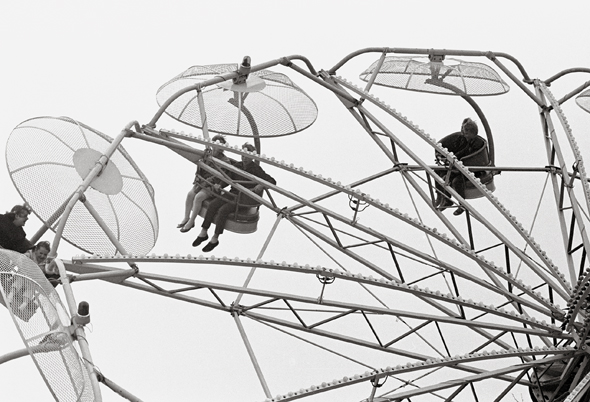
Helsinki people on the big wheel: Linnanmäki amusement park, 1968

Helsinki people on the big wheel: Linnanmäki amusement park, 1968
Photographs and excerpts from Helsinki 1968 by Claire Aho and Kjell Westö (text in Finnish, Swedish and English; WSOY, 2010)
A year that rocked the world: 1968. The Vietnam War, the Chinese cultural revolution, the invasion of Czechoslovakia, hunger in Biafra. Helsinki that year: a quiet little city, in a quiet little country. But Finland’s baby-boomers, born after the war, were now coming of age, resulting in the beginnings of a change of generation in politics; and the students of Helsinki University joined the global student unrest of this ‘crazy year’. Photographer Claire Aho takes a series of photographs of her home town, participating in an exhibition in Kiel, Germany. Forty-two years later her photos are published in Helsinki 1968, together with reflections by Kjell Westö, whose novels are deeply rooted in his native city. Here are words and images of Helsinki that mirror the past – and the present
Both the city and its people carry their past with them, find it hard to let go, and don’t really want to. Many of us are reluctant to embrace the new. Hence there is often something ambivalent, something enigmatic in the frozen moment of the photograph…. More…
French prize for Sofi Oksanen
26 August 2010 | In the news
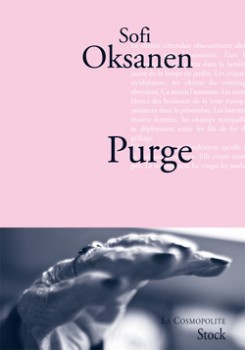 In August the ninth Prix du Roman FNAC was awarded to Sofi Oksanen (born 1977) for her novel Puhdistus (English translation, by Lola Rogers: Purge; see a recent British review [Guardian, August 21] here), to be published in French (by Editions Stock) on August 25 under the title Purge. This is the first time FNAC – the largest bookshop chain in France – has awarded the prize to an author who doesn’t write in French.
In August the ninth Prix du Roman FNAC was awarded to Sofi Oksanen (born 1977) for her novel Puhdistus (English translation, by Lola Rogers: Purge; see a recent British review [Guardian, August 21] here), to be published in French (by Editions Stock) on August 25 under the title Purge. This is the first time FNAC – the largest bookshop chain in France – has awarded the prize to an author who doesn’t write in French.
The jury consists of 900 booksellers and representatives from the general public. They read 300 novels published in France this year, and the winner was chosen out of 30 finalists.
The Finnish production company Solar Films Inc. will transform Puhdistus into a film in 2012: the screenwriter is Marko Leino.
Linnoista lähiöihin. Rakennetut kulttuuriympäristöt Suomessa [From castles to suburbs. Built cultural environments in Finland]
26 August 2010 | Mini reviews, Reviews
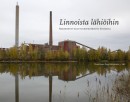 Linnoista lähiöihin. Rakennetut kulttuuriympäristöt Suomessa
Linnoista lähiöihin. Rakennetut kulttuuriympäristöt Suomessa
[From castles to suburbs. Built cultural environments in Finland]
Toim. [Ed. by] Pinja Metsäranta
Helsinki: Finnish Literature Society, 2010. 239 p., ill.
ISBN 978-952-616-206-8
€ 42, hardback
The 2009 inventory of the Finnish National Board of Antiquities includes about 1,300 nationally important built cultural environments, about a tenth of which are represented in this volume. The book introduces the reader to churches, mansions and military barracks, as well as to idyllic countryside and areas formed by industrial agglomerations. Reflected in the inventory is the diversity of the built landscape: the timber prefab districts and concrete housing estates, the reindeer fences of Lapland and the lighthouses of the archipelagos. On display are architectural masterpieces as well as everyday environments: hospitals, schools and prisons. Rural depopulation and urban sameness have changed the landscape in recent decades, but the book shows that much of value still remains. The book contains a list of all the inventory items, also available on the Board’s website (in Finnish and Swedish).
Lasse Rantanen & Hannu Tarmio: Lapin sydän [Heart of Lapland]
20 August 2010 | Mini reviews, Reviews
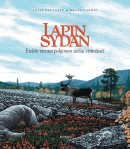 Lapin sydän. Etelän vieraat pohjoisen sielua etsimässä
Lapin sydän. Etelän vieraat pohjoisen sielua etsimässä
[Heart of Lapland. Visitors from the south in search of the Northern soul]
Helsinki: Nemo Publishing Company, 2009. 216 p., ill.
ISBN 978-952-240-015-4
€ 33, hardback
Lapland and its myths have always inspired artists and tourists. In this book two Lapland enthusiasts ponder the things that make Finns from the south return to the north over and over again. Former publisher Hannu Tarmio lost his heart to Lapland 60 years ago; Lasse Rantanen is a graphic designer who is building his own cabin in Savukoski, eastern Lapland. The book is illustrated with his ink-and-abrasive drawings. Tarmio discusses Sámi identity, the history of log floating and gold panning, river pearl mussel fishing, alcohol use, mythology, and tourism and its impact on the environment. The book contains excerpts from literature on Lapland and portraits of its authors (including Yrjö Kokko, Timo Mukka and Nils-Aslak Valkeapää) and presents indigenous Lapps – one of them was Aleksi Hihnavaara, nicknamed Mosku, a legendary but controversial reindeer herder and hunter who fought the Russian Skolt reindeer poachers.
So close to me
19 August 2010 | Reviews
Please try this first, before we enter the chamber of horrors. It’s a poem by Timo Harju:
… The old people’s home is the strange hand of God with which he strokes
his thinning hair,
a sudden shower of cackling in the dry linen closet, slightly
sad and lonely
God looks out, stirring his cup of tea as if it were on fire.
If Jesus had lived to grow old and gone into an old people’s home,
he would have been like these.
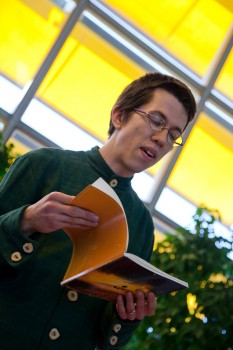
Timo Harju was awarded the 2009 Kritiikin kannukset prize (‘the spurs of criticism’, 2009) of the Finnish Critics' Association, SARV. Photo: Pia Pettersson
This spring a young Finnish female nurse was sentenced to life imprisonment for using insulin to murder a 79-year-old mentally retarded patient. Not long after, sentence was passed on another nurse – this time a meek and submissive-looking middle-aged woman who had murdered a whole series of elderly patients with overdoses of medication.
These are the terms – those of ordinary crime journalism – in which our recent public discussion of long-stay care of the elderly here in Finland was conducted. The discussion was followed by the usual misery of cuts, unchanged diapers, dehydration, over-medication, poor wages for hard work… No wonder that the concept of ‘healthcare wills’ and ‘living wills’, in which people are supposed to say how they want to be cared for in the last stage of their lives – is acquiring a disturbing undertone of ‘better jump before you’re pushed.’ More…
Memory in my hands
19 August 2010 | Fiction, poetry
A couple of years ago Timo Harju chose the non-military alternative to national service and was detailed to work at an old people’s home. Its director warned him that its inhabitants were ‘no sweet old grannies and grandpas’. Harju thought this might be a joke. In his first collection of poems, entitled Kastelimme heitä runsaasti kahvilla (‘We watered them abundantly with coffee’, Ntamo, 2009), he patiently gathers fragments of dreams and fears, memories and forgotten songs in the house of oblivion, treating them with gentle empathy. Commentary by Pia Ingström
Ward A5, Thursday
The clouds in the nursing home corridors, sky-open springlike after a bathe
and forgotten, in a frayed blue dressing-gown beside an osiery.
The grannies in the nursing home corridors, the last beautiful pride
you keep in a small wooden box behind your forehead:
if the lid opens by accident all the things may drop to the floor
topsy-turvy you won’t be able to find them, your back won’t let you
you won’t recognise them any more even if you do,
the springtime tears your insides to pieces.
Here they come, the grannies.
Better to stay here indoors, the journey to the dining room is a rough one
exposed like this
a long way and all by sleigh.
You stare at the keyhole: the clouds are coming. More…
Moomin food
19 August 2010 | In the news
A cookbook that introduces Tove Jansson’s famous Moomin family and other characters from the delightful classic stories for children (and adults), with original illustrations and quotations from the Moomin books, has been published in the UK.
Entitled Moomins’ cookbook. An introduction to Finnish cuisine (translated by David Hackston and published by SelfMadeHero), the book was compiled and written by Sami Malila and published in Finnish in 1993 (WSOY).
The Moomins are also currently being celebrated in an exhibition at the Design Shop UK in Edinburgh, entitled ‘And the World Went Mad for Moomins’. The exhibition runs until September 5.
Translations of books by Tove Jansson (1914–2001) have been published in more than 30 languages.
The cookbook offers recipes of healthy porridges and fish dishes, mushrooms and fresh berries, as well as treats like one of the Moomins’ favourites, pancakes (often cooked in the oven) with jam and whipped cream.
And as this is a cookbook for the whole family, Moominpappa’s grog contains no alcohol – but it’s no secret he enjoys a drop of good whisky (see the picture) every now and then, and a good cigar.
Anu-Hanna Anttila & al.: Kuriton kansa [Unruly nation]
13 August 2010 | Mini reviews, Reviews
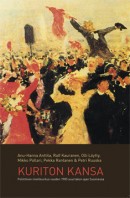 Anu-Hanna Anttila & Ralf Kauranen & Olli Löytty & Pollari Mikko Rantanen Pekka & Petri Ruuska
Anu-Hanna Anttila & Ralf Kauranen & Olli Löytty & Pollari Mikko Rantanen Pekka & Petri Ruuska
Kuriton kansa. Poliittinen mielikuvitus vuoden 1905 suurlakon ajan Suomessa
[Unruly nation. The political imagination of the 1905 general strike in Finland]
Tampere: Vastapaino, 2009. 317 p., ill.
ISBN 978-951-768-246-6
€ 33, paperback
In the beginning of the 20th century the Grand Duchy of Finland, a part of the Russian Empire, entered a period of crisis and began to turn into a nation with its own institutions. Universal and equal suffrage increased tenfold the number of those eligible to vote. A move to the granting of political rights was demanded during the 1905 general strike, which was both an internal political power struggle and a demonstration by Finns against the Russification measures being imposed by their rulers. The book examines the ideological currents of the strike period and investigates their definitions of ‘nation’ and ‘nationality’, with reference to literary research, historical sociology, cultural studies and women’s studies, making extensive use of contemporary documents. The book’s essays portray the spectrum of ideas, reflected in groups like the theosophists, Tolstoyans and anarchists.
A day in the life of a bookseller
12 August 2010 | Reviews
The bookseller Aapeli [Abel] Muttinen, a central figure in Joel Lehtonen’s ‘Putkinotko’ books, is one of those fictional characters for whom Finnish readers have cherished a particular affection, not least because of his keen enjoyment of the pleasures they themselves so regularly share when they escape to their lakeside cottages for the summer.
But although Aapeli Muttinen is Finnish through and through, he is not without counterparts in the literature of other nations. One of his close relatives is the laziest man in all literature, Goncharov’s Oblomov; others, perhaps more surprisingly, can be found in the works of Anatole France – booksellers like Blaizot and Paillot, both gentle dilettanti with a streak of individualism and a penchant for good living. Like them, Muttinen is tolerably well-read: at the beginning of the short story ‘A happy day’ we find him musing about Horace, and at least one of Horace’s odes must have appealed to him strongly: ‘Happiest is he who, like his sires of old, / Tills his own ground, and lives his life in peace, / Far from the tumult of the noisy world.’
More…
A happy day
12 August 2010 | Fiction, Prose
‘Muttisen onni eli laulu Lyygialle’ (‘Muttinen’s happiness, or a song for Lygia’‚) a short story from Kuolleet omenapuut (‘Dead apple trees’, Otava, 1918)
‘Quite the country gentleman, eh, what, hey?’ says Aapeli Muttinen the bookseller. ‘Like the poet Horace – if I may humbly make the comparison, eh, dash it? With his villa at Tusculum, or whatever the place was called, given to him by Maecenas, in the Sabine hills, wasn’t it? – dashed if I remember. Anyway, he served Maecenas, and I serve – the public, don’t I? Selling them books at fifty pence a copy.’
Muttinen’s Tusculum is his little plot of land in the country. A delightful place, comforting to contemplate when the first signs of summer are beginning to appear, after a winter spent in town in the busy pursuit of Mammon, under skies so grey that the wrinkles on Muttinen’s forehead must have doubled in number. A summer paradise of idleness… More…
Lucky strikes
12 August 2010 | This 'n' that
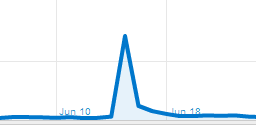
Stumbled upon: readers find Tommi Musturi's comic strip (June 10–June 18)
When Books from Finland was a printed journal, it was relatively easy to define its readership – now it is different: we are a part of the internet’s ecosystem, its surging and multifarious mass of knowledge.
Those who visit our pages may have the most diverse motives for wanting to read our articles – and they may travel surprising itineraries before arriving on Books from Finland’s pages, as we found out recently: StumbleUpon is still a fairly little-known service in Finland. Thus it took a while before we realised why so many of the comments about our piece on Tommi Musturi’s wordless comic strip, on colour and friendship, began with the words ‘I stumbled upon’… More…
Postcards from the lakeside
8 August 2010 | This 'n' that
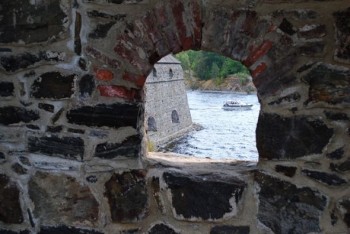
A tower with a view: Olavinlinna (St Olaf's castle). Photo: Lola Rogers
Translator Lola Rogers (of, for example, Sofi Oksanen’s best-selling novel Purge), from Seattle, spent a few weeks in Finland, and went on a cruise on Lake Saimaa.
Olavinlinna (St Olaf’s castle), and the opera, in the city of Savonlinna, was one of her stops; take a look at her blog – you’ll perhaps recognise the the inventive 16th-century wall privies on the towers we wrote about a while ago.
There are quite a few photos from Helsinki, too – from this hot, hot (too hot?) summer.
My friend Erik Hansen
Short prose from Muita hyviä ominaisuuksia (‘Other good characteristics’, Otava, 2010)
On the first day we played getting-to-know-you games. On the second day we played real Finnish baseball out behind the university. On the third day we travelled to the countryside. Classes started sometime at the end of the second week. We watched the movie One Flew Over the Cuckoo’s Nest. The professor slurped Coke, chain smoked, and rewound the video back and forth: Nurse Ratched’s plump face filled the screen and then in the next image where her face had been there was a basketball Jack Nicholson was squeezing.
It was the autumn of 1992, and I was studying film and communications theory in Copenhagen.
The excursion to the country frightened me, a shy bacteriophobic neurotic. The Danes thought the camping centre’s shared mattresses and group cooking were hygge – cozy. There is no way a dictionary translation could ever cover all the forms of cosiness the Danes achieve together. I fled the camping centre on the first morning. On the train to Copenhagen I recognised all the usual post-escape feelings: shame, fear, guilt, loneliness and overwhelming euphoria. More…


